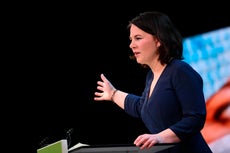An independent Scotland would likely need a trade border with England, Nicola Sturgeon has conceded ahead of next month’s Scottish parliament elections.
The Scottish first minister, who polls say is heading for another majority, said she would do what she could to “keep trade flowing easily across the border”.
But she warned that there would be challenges for cross-border businesses “because of the absurdity of Brexit and the Tory Brexit obsession”.
And in an article published over the weekend Ms Sturgeon warned that it would be undemocratic for Boris Johnson to block another plebiscite if the Scottish parliament carried a majority for independence.
“If there is a majority in the Scottish parliament after this election for an independence referendum, then Scotland must have the chance to put the recovery into Scotland’s hands,” she wrote in the Observer newspaper.
“For the UK government to seek to block it would be unsustainable. For them to try to take legal action, as has been suggested, would be asking a court to effectively overturn the result of a free and fair democratic election.
“That would be an appalling look for any prime minister. More to the point, it didn’t work for Donald Trump and it wouldn’t work for Boris Johnson.”
The decision by the UK government to leave the single market and customs union has intensified the question of a post-independence border between Scotland and England.
The SNP says an independent Scotland would seek to join the European Union, but under current arrangements this would disrupt trade between England and Scotland, as any such border would effectively be between England and an EU state.
The first minister said an independent Scotland would “comply with all of the requirements of EU membership”, but added:
“We will put in place arrangements and we will negotiate those arrangements for the UK that mean that businesses do not, in a practical sense, suffer from any of that.”
UK news in pictures
Show all 50
But despite years of talks having taken place between the UK and the EU, there appear to be precious few ways by which trade disruption can be mitigated while England remains outside the single market and customs union.
Speaking on the BBC’s Andrew Marr Show on Sunday morning, Ms Sturgeon said: “Before we get to a point where we’re asking people to choose whether or not they want Scotland to become independent, which is the choice of the Scottish people… just as we did in 2014, we will set out all of the implications of independence, all of the advantages of independence, and all the practical issues that people have to consider so that people make an informed choice.”
Polls of Scottish voters over the last year have have shown significant leads in favour of independence, though some figures published more recently have seen that lead narrow or disappear.









